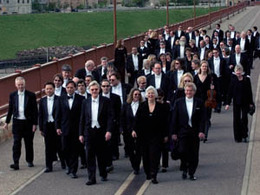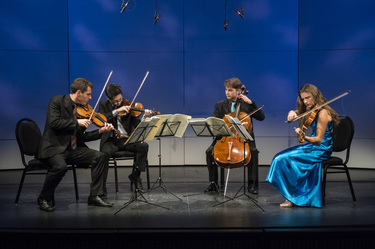 Vladimir Putin pins a medal on Valery Gergiev.
Vladimir Putin pins a medal on Valery Gergiev. I’ve heard the Mariinsky (formerly Kirov) Orchestra on a number of occasions, and one of the things that’s always struck me about this ensemble is the distinctiveness each section brings to the collective sound. Whereas many North American orchestras strive for homogeneity, it seems that the Mariinsky cultivates and encourages the unique properties of each family of instruments. As a result, the brass is brassier, the reeds are reedier, the strings are stringier, etc. With this approach, the Rite should explode in vivid colour.



 RSS Feed
RSS Feed

